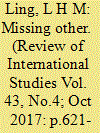| Srl | Item |
| 1 |
ID:
169632


|
|
|
| 2 |
ID:
155152


|
|
|
|
|
| Summary/Abstract |
As Andrew Linklater has shown, Europeans have decreased their tolerance for, or endorsement of, violence over the centuries. Various international and domestic conventions demonstrate the point. This accomplishment rightfully deserves celebration. But herein lies the rub. While Linklater recognises the role of imperialism and colonialism in perpetrating global violence, he does not grant equal opportunity to the Rest in contributing to the world’s new moral heights. Linklater assumes, for instance, that Las Casas never talked with indigenes to realise that they, too, warrant recognition as human beings; Catholic piety alone sufficed. The West thus towers in singular triumph, embedding International Relations (IR) in what I call Hypermasculine Eurocentric Whiteness (HEW). Still, the Other retains a sense of its Self. An effervescent spirit of play enables resilience and creativity to co-produce our world-of-worlds. Come out and play!, I urge. It’s time to shed IR’s ‘tragedy’ for the sparkle within.
|
|
|
|
|
|
|
|
|
|
|
|
|
|
|
|
| 3 |
ID:
193144


|
|
|
|
|
| Summary/Abstract |
In this article, we examine the Hungarian and Turkish responses to the EU’s handling of the 2015 refugee “crisis” through a postcolonial feminist IR framework. Drawing on hypermasculinity, we argue that both countries utilise migration to overcome their postcolonial and masculine anxieties by confronting their positions within the international hierarchies. Our examination of policy statements and speeches by Viktor Orbán and Recep Tayyip Erdoğan between 2015 and 2016 reveals three masculinised responses. First, both leaders portray themselves as acting out of paternal authority, while painting the EU as weak or inhumane. Second, they depict the EU as incompetent and their countries as competent providers of security. Third, they present themselves as protectors of European values, and the EU as in need of protection. These rhetorics suggest that both leaders used the “crisis” to challenge the current international hierarchy. Despite this, we argue that they are only concerned with their countries’ rankings within the hierarchy, not the system itself. Our postcolonial feminist reading of the “crisis” reveals that these masculinised framings are in fact counterproductive and only serve to confirm both Hungary and Turkey’s positions at the bottom of the international hierarchies, and their subordination to the EU as the EU’s others.
|
|
|
|
|
|
|
|
|
|
|
|
|
|
|
|